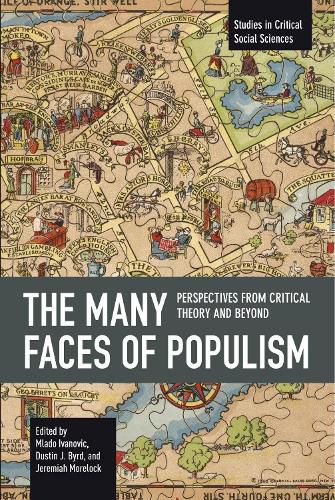Readings Newsletter
Become a Readings Member to make your shopping experience even easier.
Sign in or sign up for free!
You’re not far away from qualifying for FREE standard shipping within Australia
You’ve qualified for FREE standard shipping within Australia
The cart is loading…






Populism has become a contested and controversial word in contemporary politics. But what does "populism" really mean?
Despite its relatively short history, the term follows a rather volatile trajectory in terms of its historical development and presence as a political practice. When we look at its political and moral impact, one can see that despite its often strict national commitments and narratives, populism is rather a global political phenomenon. As embodiment of anti-establishment narratives, polarizing attitudes, and emancipatory appeal, we can follow its occurrence from Central and Eastern Europe, Latin America, the USA and UK, the Middle East, all the way to China and India.
This edited volume helps fill a gap in the existing literature on Critical Theory (broadly construed) and populism, focusing on the multiple dimensions of historical and contemporary contexts for today's rising populist movements and their often but not necessarily hostile relations towards cosmopolitanism, globalization, environmentalism, and general notions of inclusion and justice.
Contributors include: Emlia Barna, Ronald Beiner, Dustin J. Byrd, Samir Gandesha, Carlos Antonio Giovinazzo Jnior, Mlado Ivanovic, Yonathan Listik, Grigoris Markou, Jeremiah Morelock, Felipe Ziotti Narita, gnes Patakfalvi- Czirjk, Maria Cristina Dancham Simes and Hassan Zaheer.
$9.00 standard shipping within Australia
FREE standard shipping within Australia for orders over $100.00
Express & International shipping calculated at checkout
Stock availability can be subject to change without notice. We recommend calling the shop or contacting our online team to check availability of low stock items. Please see our Shopping Online page for more details.
Populism has become a contested and controversial word in contemporary politics. But what does "populism" really mean?
Despite its relatively short history, the term follows a rather volatile trajectory in terms of its historical development and presence as a political practice. When we look at its political and moral impact, one can see that despite its often strict national commitments and narratives, populism is rather a global political phenomenon. As embodiment of anti-establishment narratives, polarizing attitudes, and emancipatory appeal, we can follow its occurrence from Central and Eastern Europe, Latin America, the USA and UK, the Middle East, all the way to China and India.
This edited volume helps fill a gap in the existing literature on Critical Theory (broadly construed) and populism, focusing on the multiple dimensions of historical and contemporary contexts for today's rising populist movements and their often but not necessarily hostile relations towards cosmopolitanism, globalization, environmentalism, and general notions of inclusion and justice.
Contributors include: Emlia Barna, Ronald Beiner, Dustin J. Byrd, Samir Gandesha, Carlos Antonio Giovinazzo Jnior, Mlado Ivanovic, Yonathan Listik, Grigoris Markou, Jeremiah Morelock, Felipe Ziotti Narita, gnes Patakfalvi- Czirjk, Maria Cristina Dancham Simes and Hassan Zaheer.